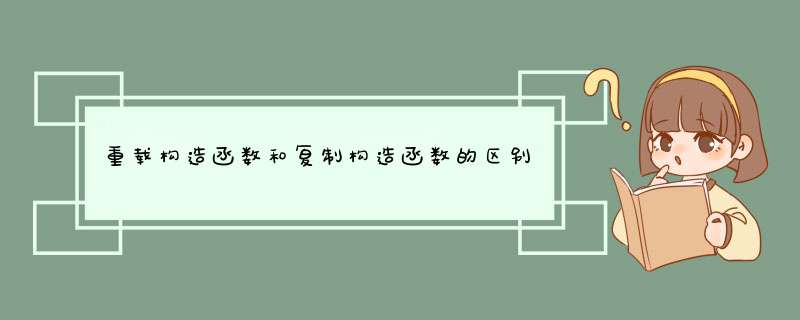
重载构造函数是为了更灵活,有更多方式进行初始化。
但当你把对象A赋值给同类的或派生的B时,C++默认按位拷贝,A和B将共享内存。
有三种情况出现按位拷贝:
第一种:Myclass A=B;
第二种:fun(Myclass a); 对象作为参数传递,是按位复制的
第三种:a = fun(); 函数中使用临时对象作为返回值
定义复制构造函数避免按位复制,并保证A和B使用不同的共存,互不影响。复制构造函数只能用于初始化。
#include<iostream>
#include<string>
/
Name:
Copyright: Institute of Computer Network & Communication Technology(CCNU)
Author: ccnupq
Date: 07-10-07 13:56
Description:
/
using namespace std;
/! @class
类名:String
功能:实现String 类的构造函数、析构函数、拷贝构造函数、赋值函数,字符串相连函数等等
/
class String
{
public:
String(const char str=NULL);//构造函数
String(const String &);//拷贝构造函数
~String(void);//析构函数
String& operator=(const String &);//重载"=",字符转赋值
String& operator+(const String &other);//,重载"+",字符串链接
String& operator-(const String &other);//,重载"-",删除字串
bool operator==(const String &other);//重载"==",判断两个字符串相等
bool operator<(const String &other);
bool operator>(const String &other);
//重载<<,这里必须使用friend,因为涉及到两个类之间私有成员的访问
friend ostream& operator << (ostream &, const String &);
private:
char m_data;
};
//构造函数
String::String(const char str)
{
if(str==NULL)
{//无参数,默认构造一个空串
m_data=new char[1];
m_data='\0';
cout<<"调用了默认构造函数"<<endl;
}
else
{//有参数,
int length=strlen(str);
m_data=new char[length+1];
strcpy(m_data,str);
cout<<"调用了普通构造函数"<<endl;
}
}
//拷贝构造函数,用一个对象初始化另外一个对象的时候调用
String::String(const String &other)
{
int length=strlen(otherm_data);
m_data=new char[length+1];
strcpy(m_data,otherm_data);
cout<<"调用了拷贝构造函数"<<endl;
}
//析构函数
String::~String()
{
delete[] m_data;
}
//重载运算符"=" ,用一个对象赋值给另外一个对象的时候调用
String& String::operator=(const String &other)
{
if (this==&other)
return this;
delete [] m_data;
int length=strlen(otherm_data);
m_data=new char[length+1];
strcpy(m_data,otherm_data);
cout<<"重载了运算符="<<endl;
return this;
}
////重载运算符"+"
String& String::operator+(const String &other)
{
char temp[100];
strcpy(temp,m_data);
int one_length=strlen(m_data);
int other_length=strlen(otherm_data);
delete[] m_data;
m_data=new char[one_length+other_length+1];
strcpy(m_data,temp);
strcat(m_data,otherm_data);
cout<<"重载了运算符+"<<endl;
return this;
}
String& String::operator-(const String &other)
{
char temp,p;
if( (temp=strstr(m_data,otherm_data)) ==NULL)
{
cout<<"没有符合的子串,不能使用'-' *** 作"<<endl;
return this;
}
else
{
p=temp;
temp=temp+strlen(otherm_data);
p='\0';
strcat(m_data,temp);
}
cout<<"重载了运算符-"<<endl;
return this;
}
//重载运算符"<<"
ostream& operator<<(ostream &output, const String &other)
{
output<<otherm_data;
cout<<"重载了运算符<<"<<endl;
return output;
}
bool String::operator<(const String &other)
{
if(strcmp(m_data,otherm_data)<0)
return true;
return false;
}
bool String::operator>(const String &other)
{
if(strcmp(m_data,otherm_data)>0)
return true;
return false;
}
bool String::operator==(const String &other)
{
if(strcmp(m_data,otherm_data)==0)
return true;
return false;
}
/! @function
函数名:main
/
int main()
{
String s1("Hello,");
String s2("World!");
String s3(s2);//调用拷贝构造函数
String s4(s2);
String s5("Hello,World");
String s6("Hello,World!");
String s7("Hello,World!");
String s8("o,W");
String s9;
//String s3;//调用构造函数中的默认构造
//s3=s2;// 调用重载后的赋值函数
cout<<s1<<endl;
cout<<s2<<endl;
cout<<s3<<endl;
s3=s1+s2;
cout<<s1<<endl;
cout<<s2<<endl;
cout<<s3<<endl;
if(s4==s2)
cout<<"两个字符串相等"<<endl;
else
cout<<"两个字符串不相等"<<endl;
if(s5<s6)
cout<<"s5小于s6"<<endl;
else if(s5>s6)
cout<<"s5大于s6"<<endl;
else
cout<<"s5等于s6"<<endl;
s9=s7-s8;
cout<<s9<<endl;
system("pause");
}
//c++自定义类型中有个vector容器,容器里面是一些指针,如何写这个类的复制构造函数和重载=符?
#include <vector>
#include <iostream>
using namespace std;
class Element
{
public:
Element(int data) {
cout<<__FUNCTION__<<" is called"<<endl;
m_data = data;
}
~Element() {
cout<<__FUNCTION__<<" is called"<<endl;
}
void show() const {
cout<<m_data<<endl;
}
private:
int m_data;
};
class Foo
{
public:
Foo() {
cout<<__FUNCTION__<<" is called"<<endl;
}
~Foo() {
cout<<__FUNCTION__<<" is called"<<endl;
for (int i = 0; i < m_elmssize(); ++i)
delete m_elmsat(i);
m_elmsclear();
}
Foo(const Foo& other) {
cout<<__FUNCTION__<<" is called"<<endl;
for (int i = 0; i < otherm_elmssize(); ++i) {
Element p1 = otherm_elmsat(i);
Element p2 = new Element(p1);
m_elmspush_back(p2);
}
}
Foo &operator=(const Foo &other) {
cout<<__FUNCTION__<<" is called"<<endl;
if (&other != this) {
for (int i = 0; i < m_elmssize(); ++i) {
delete m_elmsat(i);
}
m_elmsclear();
for (int i = 0; i < otherm_elmssize(); ++i) {
Element p1 = otherm_elmsat(i);
Element p2 = new Element(p1);
m_elmspush_back(p2);
}
}
return this;
}
void addElem(Element elem)
{
m_elmspush_back(elem);
}
void show() {
cout<<"Foo::show:"<<endl;
for (int i = 0; i < m_elmssize(); ++i)
m_elmsat(i)->show();
cout<<endl;
}
private:
vector<Element > m_elms;
};
int main()
{
Foo foo1 = new Foo();;
foo1->addElem(new Element(1));
foo1->addElem(new Element(2));
foo1->addElem(new Element(3));
foo1->show();
delete foo1;
cout<<"----------------"<<endl;
foo1 = new Foo();
foo1->addElem(new Element(11));
// copy constructor called
Foo foo2 = new Foo(foo1);
foo2->addElem(new Element(8));
foo1->show();
foo2->show();
cout<<"-----------------"<<endl;
delete foo1;
foo2->show();
cout<<"-----------------"<<endl;
Foo foo3 = new Foo();;
// = called
foo3 = foo2;
foo3->show();
foo3 = foo2;
foo3->show();
return 0;
}
构造函数 是一种特殊的方法 主要用来在创建对象时初始化对象 即为对象成员变量赋初始值一个类也可以有多个构造函数,用来初始化不同形式的类。
拷贝函数是特殊的构造函数,用来完成对象初始化,即定义时赋值,下面程序中有详解。如果没有定义,系统会调用默认的拷贝构造函数,但此函数不能处理深拷贝问题,及若有new用到,系统的只是共享区域,不分配新空间。
赋值函数要用运算符重载来实现。下面有程序。
#include <iostream>
using namespace std;
class time
{
public:
time() //constructor构造函数
{
hour=0;
minute=0;
sec=0;
}
time(const time &obj) //拷贝构造函数
{
hour = objhour;
minute = objminute;
sec = objsec;
}
time& operator=(const time &obj) //运算符重载,用来完成赋值函数
{
this->hour = objhour;
this->minute = objminute;
this->sec = objsec;
return this;
}
void set_time();
void show_time();
private:
int hour;
int minute;
int sec;
};
int main()
{
class time t1; //调用time()构造函数为成员赋初值
t1show_time();
//t1set_time();
t1show_time();
time t2 = t1; //调用拷贝构造函数,为对象t2赋值
t2show_time();
time t3;
t3 = t1; //调用运算符重载=函数,为对象t3赋值
t3show_time();
return 0;
}
void time::set_time()
{
cin >>hour;
cin >>minute;
cin >>sec;
}
void time::show_time()
{
cout<<hour<<":"<<minute<<":"<<sec<<endl;
}
关于构造函数,拷贝构造函数等,百度词汇,书本上都有详解,可以认真看一下。愿学习进步!
当新对象被创建的时候,构造函数会被调用。每一个类都有构造函数。在程序员没有给类提供构造函数的情况下,java编译器会为这个类创建一个默认的构造函数。
java中构造函数重载和方法重载很相似。可以为一个类创建多个构造函数。每一个构造函数必须有它自己唯一的参数列表。
java不支持像c++中那样的复制构造函数,这个不同点是因为如果你不自己写构造函数的情况下,java不会创建默认的复制构造函数。
赋值运算符和复制构造函数都是用已存在的B对象来创建另一个对象A。不同之处在于:赋值运算符处理两个已有对象,即赋值前B应该是存在的;复制构造函数是生成一个全新的对象,即调用复制构造函数之前A不存在。
CTemp a(b); //复制构造函数,C++风格的初始化
CTemp a=b; //仍然是复制构造函数,不过这种风格只是为了与C兼容,与上面的效果一样
在这之前a不存在,或者说还未构造好。
CTemp a;
a=b; //赋值运算符
在这之前a已经通过默认构造函数构造完成。
而之所以要自定义这些,是因为防止有指针时浅拷贝造成错误。具体可百度 rule of three原则
调用cwnd的无参构造函数是生成成员变量t
你用一个整数对t赋值的时候(t=1; t=2;)实际上做了很多事情,首先,t和整数的类型不一样,编译器不能直接赋值,它会先去找int或者unsigned long和cwnd之间的关系,也就是自动寻找如何把unsigned long变成cwnd的方法,它找到了cwnd的带参数那个构造函数,然后调用它,生成一个临时对象,然后赋值。这个过程也就是自动类型转换,你可以去搜一下相关的资料。
另外,在赋值的时候由于没有重载赋值运算=,所以进行的是按位拷贝,当然这和你的问题已经无关了
欢迎分享,转载请注明来源:内存溢出

 微信扫一扫
微信扫一扫
 支付宝扫一扫
支付宝扫一扫
评论列表(0条)